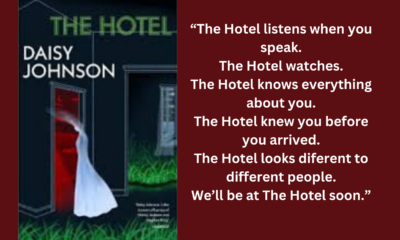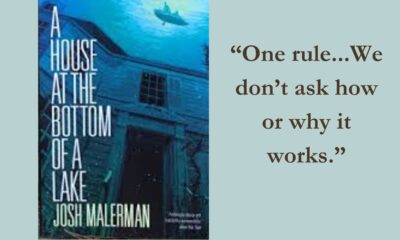
Haunted MTL Original – Orisha – Michael Washburn
More Videos
Published
5 years agoon
By
Shane M.“Orisha” by Michael Washburn
The doorbell rang. Mary Rowland put down her newspaper, walked to the front door of her father’s spacious house, and opened it. Outside stood one of the last people in the world she cared to see. She gazed at Joe Hoyt, six feet two inches of roiling flesh in a dull red windbreaker and jeans, a couple of days’ pepper and salt on his ruddy face and neck. Mary guessed he’d been drinking heavily again and was unequal to the mental effort needed to recall tasks like shaving. He swayed a bit as if standing at the entrance to a rich family’s home was a heady experience. Mary noticed a tiny yellow slip in his right hand.
The dark brown eyes set deep in the ruddy face gazed at her.
“Is your father home, Mary?”
“Oh, no. He’s never home at this hour of the day. He’s in town.”
“Well, what’s he doin’ there? D’you expect him back in the next half hour or so?”
Mary found the questions invasive, but kept her tone even.
“Ah, no. I don’t know. Can I help you?”
Joe held up the little slip.
“Your father hired me and my boys to haul away some bricks and cinderblocks from his restaurant the other day.”
“Didn’t he pay you?”
“Yeah, he sent me a check, but there’s still a balance on the account. My boys and I worked longer than your father said the job would take.”
Joe hardly struck Mary as the type of citizen with whom her dad would open an account. She saw him and his pals as the dregs of this region of England. His physical presence was scary and she found the moment exceedingly awkward. She’d have words with her father later.
“He’s not home. I’ll tell him to give you a call.”
Joe grunted and said something under his breath, which sounded like, “I can come in if I want to.”
“What!?!”
“I mean, I have every right to ask you to settle this now.”
The giant didn’t move. His eyes shifted, left to right and right to left, as if trying to probe the depths of the hall behind Mary. She deeply disliked this effort to penetrate her private space. Joe was dirt poor and behind Mary was a house full of bright shiny things.
“It would be good to settle this now if we can.”
“I just told you my father isn’t here.”
“Can you settle up?”
“No. You must’ve been raised by wolves, showing up like this unannounced. I’m going to ask you to leave now.”
Joe’s look said, or what? Again his eyes flitted around, taking the full measure of Mary’s isolation and vulnerability or maybe appraising the value of items just beyond Joe’s reach. He swayed a bit, bolstering the impression that he’d been drinking hard. Mary wondered whether to slam the door and call the police.
“My father’s an honest man, Joe. You’ll get the balance very soon. Now please leave and don’t ever show up here again without calling.”
Mary would have been happy to end the sentence without those last two words, but Rowlands were polite and tactful. Again those eyes flitted around, displeasure and contempt creasing that large puffy face.
“Don’t think bloodsuckers can go on cheating working people forever.”
Again she thought of calling the police.
“Would you rather never work again, Joe?”
At last, with a roll of the eyes, Joe turned and sauntered off the front steps and onto the path leading off into the mist.
Mary went back inside and reached for the plastic phone in the kitchen. It was 2001 and some of her friends had gotten cell phones, but Mary was behind the curve, a fact she found ironic given her wealth. Sometimes she just couldn’t avoid feeling lazy in the face of tech trends.
Her father answered the phone in his office downtown and heard her out.
“Calm down, Mary. Please listen. Joe’s not a genius. There’s a reason he’s not a partner at a city firm. One occasionally has dealings like this.”
“I can’t fathom why you ever hired this person.”
“Believe me, it won’t happen again. The workmen who were at the restaurant the other day, clearing the way for an extension, left piles of bricks and cinderblocks and debris right outside when they went home for the day. They said they’d be back early in the morning, but it would’ve been a huge eyesore for my customers. It just happened that Joe and his boys were available right away.”
“I forgive you. But please—”
“It’ll never happen again. I promise, love.”
How often Arthur Rowland spoke to his daughter in an ostentatiously indulgent manner that had little to do with his real intent. But for the moment she felt pacified. They’d been getting along marginally better in the last few months, and she wanted that to go on. It was an uncertain prospect. Though proud and protective of Mary in many ways, Arthur on occasion neglected to tell her of things that could disrupt her life. Joe Hoyt was one example. At the other end of the social spectrum, one of the investors in her dad’s business ventures was a boozer in a failing marriage named Ray Hewlett. Once in a while, Mary’s father put Ray up in the guest room of the house, and he sometimes forgot even to mention it to Mary. On one occasion Ray had gawked as Mary walked by the guest room in a towel.
She also didn’t know how long her truce with her father could survive her association with Cara LaVey, whose parents were far too poor to dine in Arthur Rowland’s restaurant. Mary saw Cara as her best friend at this time of life, even if Mary’s boyfriend, Sam Thorne, competed fiercely with Cara for her attentions.
In the mid-morning of the following day, the phone rang.
“Mary? It’s Sam.”
“Hi, love.”
“I was wondering if you can come to the pub this evening and let me buy you a few rounds.”
“I’d like to but I’m hanging out with Cara. We made plans last week. So, how about a rain check?”
It was a weak pun. Mary heard a groan, a click, and the gathering force of the rain outside.
Cara LaVey entered and left houses and establishments so lithely and subtly you might never notice, but her presence forced people’s attention. Her hair was as rich and dense as the foliage on the black poplars shrouding the hills Mary looked out on from her bedroom window. The stray dimples on Cara’s cheeks enhanced the paleness of her supple flesh. Though she wasn’t stingy with her smiles, they were often disconcerting because you didn’t know what they were about. Cara was one of those young people whose schooling or lack thereof gives no clue as to their knowledge or intelligence. Though Cara had a laid-back personality, she spoke with a precision, a dignity, alluding to realms of erudition of unknown vastness. Among Cara’s favorite topics were secret societies, mystic figures, weird phenomena, the role of karma in human affairs, occult lore in general.
Seated on the couch in the living room, gazing at Mary over an elegant black table, Cara sipped tea as Mary related her ugly experience. When she finished, Cara finally spoke.
“Hey, now, don’t overreact, and don’t be mad at Joe. He’s simple. I doubt he has the maturity and awareness to step back and see how his behavior affects others.”
“Oh, I’m not mad at that epsilon. I’m angry at my father. Again.”
“For stepping outside certain social bounds?”
Cara’s words were lacerating. That wasn’t what Mary had tried to convey.
“Look, I don’t think my father meant to give an opportunity to some blue-collar types. He just wanted to avoid the embarrassment of the respectable folk coming to his bloody restaurant and seeing such a big mess. He dresses up his snobbery and insularity as decency.”
“Well, I can’t say your father’s reputation is ill-deserved.”
Mary felt no need to rush to Arthur Rowland’s defense. The tea was light and tart, the cadences of the rain outside soothing, Cara’s calm presence as agreeable as ever.
“I know I need to choose my words better. I’m not like my father.”
“Of course you aren’t like your father, Mary, or we wouldn’t be friends. You just had a nasty experience and your thoughts are all over the place.”
Leaning back in her plush chair, Mary inhaled the rich aroma of her tea and wondered how to voice what was on her mind.
“I’ve been trying to figure out why I, and others, find your company so soothing. I’m no Philip Larkin but if I had to choose a few words, I’d say it’s because you’re so far above the fray. You’ve got this kind of cool, detached perspective. I associate you with the sound of rain.”
Cara gave one of her enigmatic smiles.
“That follows, Mary.”
“I don’t understand.”
“I’m an orisha.”
“A what?”
“Someone from a remote age but also outside of time. I’m in touch with the relations among spirits and elements and people and planets and things. Don’t trouble yourself about the meaning of the term, just be glad that I’m in your life.”
“No wonder my father doesn’t want you around.”
“Should I leave?”
“Cara! Please! You know what a pompous ass I think the man is.”
“Yes, I know. The current incarnation of a dynasty that’s inspired revulsion and hate among the grubby working people of this county. Not to mention a hypocrite. He frequents some pretty seedy dives when he’s drunk and looking for action.”
They both had another cup of tea before Cara went out into the rain.
Two days later, Mary felt like inviting Cara over again, but Sam had extracted a promise that they’d go to the pub together. At this point in time, the will to push back felt diminished. It gave Mary no small pleasure to open the front door and gaze into the grinning face of a man for whom her feelings were usually positive. If Sam was so jealous of her time, of their time, he must really be into her. Mary reflected now on how much she’d enjoyed her first few dates with Sam, but regretted that there had followed a few exchanges between Sam and her father in the living room, to whose content she was not privy.
After having tea in the living room, they set off to get real drinks. The drizzle was gathering force as Mary’s blue Peugeot sped and swerved up the road between odd clusters of cottonwood bushes toward the pub two miles off. A drizzle commenced, then it began to rain moderately. Without taking her eyes from the road, Mary posed a question.
“Sam, do you know what an orisha is?”
He didn’t look away from the road as he answered.
“My education’s worth every quid my parents spent on it, Mary. Yes, I do know what an orisha is. It’s got something to do with Yoruba customs and beliefs, I recall.”
Perhaps Sam had hoped to impress her, but his answer made her wonder whether Sam and Cara had been meeting in private. As if on cue, Sam now mentioned the latter individual.
“I’ve heard a little about this friend of yours, Cara LaVey. I know she’s into some pretty outré stuff, including tribal customs and beliefs. How much do you know about her? What exactly does she do?”
“I already told you. She’s a spiritual advisor.”
Mary knew she might as well have said unemployed flake.
“Where’d she live before moving to these parts?”
“I never asked her.”
“So she might have just materialized from another dimension, for all you know.”
“If you want to put it that way.”
“You know what I suspect, Mary? I think your friendship with her is meant as a big fuck you to your father. Because in your mind, he detests her for all the wrong reasons. My guess is that Arthur Rowland hasn’t given the matter enough attention even to know what tradition Cara’s beliefs are part of. She might as well be some kind of pagan sorceress for all he knows or cares. To him, she’s just not a serious person and the world has no use for her.”
Mary considered this as the car neared a sharp curve in the road.
“I’ve got a feeling he’ll soon learn how wrong he is to dismiss her, Sam,” Mary said, her deadly serious look enhancing the portentousness of her words.
“Mary!” Sam cried out.
As the curve evened out, Mary saw to her horror that a row of bushes had concealed a man on a bike from her view. The car got within inches of him before she saw the colors of his windbreaker and spun the wheel to the right as hard as she could. The startled man jerked the bars the other way as the car sped past him, missing by inches. In the rear-view mirror Mary saw the rider and bike weave and swerve and spill into a ditch on the left side of the road. She gasped. The man fell sideways off the bike, into the mud. Mary hit the brake.
“He’s not hurt,” said Sam, gazing back through the rear windshield.
“Oh, no. Oh, Christ, please don’t tell me.”
“What?”
“Of all the bloody people in the world.”
“What, Mary?”
“It’s Joe Hoyt!”
Sam looked back again.
“Well, too bad for him. It was his fault in the first place, riding in the middle of the road like that. Anyway, forget it, he’s not hurt.”
But Mary knew that fleeing the scene of an accident was a serious offense. She began to drive in reverse, back down the road in the intensifying rain, checking the rear-view mirror constantly for anything at all. Passing by the ditch again, she saw no sign of the bike or the man she took to be Joe.
“Please forget it, Mary. I doubt he recognized the driver. It’s an academic point anyway because he’s fine.”
Mary saw his point. In the scheme of things, maybe the incident was rather trivial.
Not quite twenty minutes later, the Peugeot swung into the parking lot of a rectangular building with neon signs in the front windows below a big sign with an image of a serpent coiled around the letters HANLON’S. Mary and Sam walked into the dimly lit pub, where a few figures huddled in booths or at the counter opposite the entrance, talking and raising mugs to their lips. They took a seat in the center. As soon as Sam had a beer in front of him, he grew looser and began to crack jokes, reminding Mary of how much fun their first few dates had been.
“I was in a serious relationship before I met you, Mary. Problems arose when I tried to persuade her that prenup agreements are so romantic.”
Mary had a good laugh at this.
“I can really take care of the woman in my life, whoever that ends up being.”
“I don’t doubt it, Sam.”
“Money’s never been an issue for me, although, like a lot of people, I’ve been trying to figure out, you know, what I’m really best at. I once asked my parents if I could be a constable when I grew up. My father said, Sam, that’s not really a role for someone of your class. I said, so? Can’t you put me in a different class?”
Mary laughed again.
“You know, my dad never entered into a prenup with my stepmom, and I think he regrets it. So they may have to divorce and remarry.”
Mary didn’t laugh. It wasn’t a joke, but a comment on the marital life of a nasty man she wasn’t looking forward to meeting.
“Hey, Mary, I don’t want to dominate this discussion. What’ve you been reading?”
“Oh, when Joe stopped by the other day, I was reading about the David Irving case. You know, that crazy revisionist historian and holocaust denier.”
“A creep.”
“To put it mildly. But this review by Geoffrey Wheatcroft of a book about the case was a bit puzzling. At the start of the review, Wheatcroft says that people have an exaggerated sense of class divisions in the U.K., that they aren’t really so bad. Then at the end, he says that David Irving comes from the kind of social twilight that breeds extremism. Which sounds like a pretty snobbish comment, not that I have any sympathy for Irving.”
Sam downed some more beer.
“If Geoffrey Wheatcroft comes out here to do a reading, I’ll buy him a pint and tell him he’s the damn best public intellectual we’ve got, after Hitchens and maybe Cockburn, and he’s a hundred percent right. The social twilight has bred all kinds of freaks!” Sam said with a gesture around the dimly lit pub.
“Please, Sam. Not so loud.”
Mary paced herself, making her second glass of beer last, but Sam was having a bit too much fun, putting away one drink after another. All around them, men talked in low voices, mostly minding their business, but Mary thought she detected looks their way here and there.
“Come on, Mary. You need another,” said Sam.
“No.”
“Come on!”
“I’m the one driving tonight.”
“You’re not seriously saying you’ll be ripped after three drinks.”
“Okay, then.”
“You know, I kind of doubt Wheatcroft will ever come out here to do a reading, because not too many chaps here even read.”
“Please don’t talk so loud, Sam.”
“I’ll talk as loud as I bloody please. Maybe I’ve been too hesitant to acknowledge that though this is in many ways a delightful part of the country to live in, it’s also a largely unlettered province. There’s a wealthy caste, and then a lot of brutes. One of the pleasures of living here is watching them humiliate themselves with their ignorance.”
Mary looked nervously around again. Sam went on.
“We need the builders and renovators and movers even though they’re not people you’d want to associate with. A bunch of louts and criminals, the lot of them!”
Sam was yelling now.
“Please quiet down, Sam.”
“No! You appreciate the truth of what I’m saying as much as I do. You know the contractors around here are crooked and stupid. And one thing about dim-witted people, you may have noted, is that they tend to assume others are just as dumb and they can get away with their hare-brained scheming and skimming and stealing. Idiots, morons, petty crooks, the whole lot of them!”
Once again Mary looked anxiously around. To her alarm, a man in his forties with dark hair and a stern look on his face moved toward their table in the dim light. Had she seen him before?
The man set a glass of beer on the table before Sam.
“Here. This one’s on me, boy.”
“Thank you, sir,” Sam said, without deigning to make eye contact with the man, who continued.
“You know, at my firm we have a tradition of integrity and honesty going back to our founding. To before then, in fact, to the time my father took me on his knee and told me all about business ethics.”
With her eyes, Mary implored her boyfriend to be polite. Sam leaned toward the man.
“I recognize you. Gerald Sutton. You’re pretty successful, as these things go. I know you’ve had no trouble getting contracts with Mary’s father, although he may think twice about hiring you again after your men left a mess at the restaurant and they had to bring Joe Hoyt over. What a fuck story.”
Once again Mary looked anxiously around the pub. Gerald’s tone stayed mild.
“On the contrary, Sam. Arthur has spoken highly about our work and he wants us to submit bids for two more jobs at his other properties.”
“What’d I just say, Gerald? You have no trouble getting contracts with Arthur or with anyone else around here. You’ve got them all in your pocket because the Camorra crime family has you in theirs.”
“Sam!” Mary cried out.
“Oh, no, what am I saying? I must be really drunk.”
Gerald ventured a smile. Sam went on.
“What am I saying? Not the Camorra mobsters, the Calabrians! They’re expanding in the U.K. with their drugs and racketeering, and you’re sucking each other’s cocks and that’s why you’re so successful at getting contracts and hiring the crews you want. Don’t deny it, Gerald. You’re a grifter if I’ve ever seen one!”
Gerald’s response was another gentlemanly smile.
“Well, young man, that’s a fairly serious accusation. May I ask how you learned these shocking facts?”
“Arthur Rowland talks a lot when he’s deep in his cups. I know things about Mary here that I don’t think even she knows.”
Mary’s lips began to form words but Gerald gently touched her hand, still with a tender smile on his dignified face.
“Sam here may be a tad voluble when drunk, but he’s a charming young man. You’re extremely cute together. I’d love to sit down with Sam sometime and talk about business ethics and how one gets to where I’ve gotten in the world. Here, why don’t you kids enjoy a couple more rounds on me,” he said, dropping a few bills on the table.
“Thank you, sir,” Mary said in a humble voice.
“You’re most welcome. Just please make sure you drive.”
Gerald turned and retreated to one of the dark corners of the pub. The shame and humiliation Mary felt now were like scalding water. She gazed across the table at her boyfriend in shock. The look Sam gave in return was faintly condescending.
“Mary. I thought you could take a joke. Gerald and I go way back, didn’t you know that?”
If this was true, then she’d overreacted once again. But to Mary the shapes in the dimly lit corners were as inscrutable as ever. Sam was mercifully quiet as she drove him home.
On the following afternoon Mary was home all alone, in a meditative mood. She sat in the living room listening to the rain pattering on the roof and thudding against the windows. Rain was general over this part of England, the reassuring backdrop to the advance or retreat of every emotion, though it spurred some emotions more than others. Even at its fiercest and most relentless, at the height of a ferocious gust, it lulled the mind with a reminder of dependable phenomena. Rain fell all over the county, on the farms with their acres of mulch enclosed by meticulously positioned logs and coils, on the acres of black poplars with thick branches stirred to life by the surging winds, on the roofs of citizens rich and poor for whom this bucolic county posed a proposition: live here or live somewhere from which you will continually dream of escape.
It was still pretty early in the afternoon, and the gusty wet day held out potential. Seated in the living room, looking out through the sliding door at the rear of the house, she picked up the phone and called Cara.
“Mary, it’s lovely to hear your voice, but I can’t come over now,” Cara said.
“What about later?’
“I don’t know. I’m meeting with a client in a bit and I can’t say just how long his spiritual instruction will take.”
“Please, Cara.”
“You sound miserable. What is it, Mary? Did you have a rotten experience with this new boyfriend of yours?”
“God, you’re smart.”
“Let me speak to him. Then I’ll share my thoughts with you on whether he’s really worth bothering with.”
Mary thought that Cara’s sense of people was infinitely better than her own, and here was a good practical suggestion. She gave Cara a phone number.
“Thanks, love. No promises, but I’ll see if I can make it over later.”
“Please, Cara.”
“Bye, love.”
Mary put down the receiver and sat listening to the rain. She thought her state right now was depression or something pretty close, a state of knowing what she was doing amounted to nothing but lacking the will to make a plan and get up and act. Yet she was perhaps not as miserable as Cara had suggested. The rain didn’t exactly make her happy but it made her life, her biological and emotional life, feel like one of the infinite variety of natural processes.
Mary looked out through the sliding door again. The day was young and Cara just might make it over here before her father got home. Blasts of rain hit the window at intervals, fostering the sense that the white afternoon outside was an amorphous entity that could lash out in any way at any time it chose. Yet to Mary it possessed no malevolence. The phenomenon was as soothing, as pleasant, as ever. She gazed out into the white.
Now she heard a noise in the guest room down the hall. A thwack!, as if a book had fallen off a table. She got up, walked down the hall, paused at the door. Maybe Ray Hewlett was asleep in there. Maybe he was naked. Mary decided to call her father. She returned to the living room, picked up the phone, but didn’t hear a dial tone. Maybe the weather today was a less benign force than she’d thought.
She sat down again, resigned to further contemplation. The rain fell on the edges of this potentially awkward scene, soothing her with its cadences as it had always done. She gazed out though the sliding door again, then looked through the window at the side of the house.
In her peripheral vision, a dark shape filled the space on the far side of the sliding door. Just as her eyes rotated back that way, a near-deafening shriek rent the air as the sliding door burst into dozens of shards. The tip of a crowbar passed within inches of Mary’s face before Joe Hoyt jerked the tool backward and used it to sweep away the glass still in place. With a scream Mary reached for the phone before realizing what Joe must have done. The giant stepped through the gap in the rear of the house and faced her with a grin.
“I will have what Arthur Rowland prizes most in this world.”
Mary slid out of the chair. If Ray Hewlett was in the guest room, just maybe he could save her. The giant leered.
“You almost killed me on the road the other day, and you didn’t even apologize. I doubt you’ve given it a thought since the day it happened.”
Though she couldn’t really challenge Joe on the last point, she found the courage to speak.
“It was totally an accident, Joe. And not entirely my fault. I went back to look for you but you were gone.”
“I was lying in the bushes hoping I was wrong about my leg, Mary.”
“But I tried to help you!”
“Do you know what sort of man your father is? Not only did he refuse to settle up with me and my boys for the honest work we did, but he threatened to have me arrested if I came near this house again. He said, ‘Joe, it’s a damn pity we have to share this world with the progeny of a genetic cesspool.’”
Mary picked up the plastic phone and flung it at the intruder as hard as she could. She turned and ran down the hall, past the guest room, and up the stairs, knowing her missile had done little save to enrage Joe further. She dashed into her bedroom, locked the door, ran to a window on the side of the house, and lifted it open. As soon as she did so, a stocky man in a t-shirt and sweatpants looked up at her from a spot on the ground below. He held an umbrella but wasn’t using it because the roof’s jutting shingles protected him. She thought she recognized a member of Joe’s crew, by the name of Tony Duke. She knew he’d catch her if she leapt from any of the windows and could probably end Mary’s life by sitting on her.
Joe pounded on the door.
“You’ve got nowhere to run to, spoiled little bitch. Come out now!”
“Joe. Do you really have any idea how much money my father has? If you harm me, you’ll have to sleep with a grenade under your pillow for the rest of your sorry life!”
She heard a coarse, bitter laugh.
“Like that would be a step down for me.”
“I’m serious, Joe. He’ll have men string you up by your ankles and cut you open and watch your guts fall out. Get out of here now!”
Joe laughed again.
“I don’t think you know who pays most of my wages. I’m not afraid of your daddy. Now open up, sweetheart. I just want to have a frank discussion with you.”
“What are we having now?”
“Open up or you’ll bloody well regret it, you bitch!”
The door began jumping out of its frame as Joe gave it swift vicious kicks. Mary passed a bit of urine involuntarily as she began to look around for something she could hurt the giant with. She saw nothing. The door jumped and bounced and rattled. She looked out the window again. The creep down there hadn’t budged.
She turned again. The door burst right out of its frame and slammed into the wall. The giant came in so fast she couldn’t even get her arms up. He seized her by the torso and carried her out of the room, down the stairs, and back to the living room, where an appalling sight greeted her.
Another of Joe’s boys, Howie Gordon, had Ray Hewlett in a headlock. Ray’s huge gut dangled over the band of his piss-stained underwear, the only thing he had on, his wispy hair was all askew, and he appeared to be in a kind of daze, not obviously related to the circumstances.
“Ray here got blackout drunk again. I found him in the room over there in a pool of puke with drool comin’ outta his mouth,” Howie said.
“Uhhhhhrrrrrr,” said Ray.
Mary heard the front door open. Tony Duke joined them in the living room.
“Feisty little you bitch you got there, eh Joe?”
“To say the least.”
Joe dropped her. Then giant pulled a Beretta from a pocket of his windbreaker and pointed it at her face.
“So, Mary. Would you care to repeat what you said to me the other day?”
Mary looked down the gun’s barrel, feeling the scrutiny of the others in the room.
“I don’t think I said anything memorable, Joe.”
Joe laughed, and Howie and Tony joined in.
“You said something about my parents.”
The tip of the gun moved closer.
“I never said a word about your parents.”
“Oh yes, I think you did, when you made a comment about my upbringing.”
Now Mary remembered. Raised by wolves.
“I wasn’t talking about you, Joe. That’s just a generic comment people make in the face of any breach of manners. People have said it about me too.”
Joe and his boys had a good laugh at this. He aimed the gun at Mary’s forehead. But now a noise distracted Joe. It sounded as if a pair of vehicles were pulling up in the mulch outside the house. Howie turned and moved up the front hall and out the door.
Joe looked at Mary.
“No one’ll touch me while I have your life in my hands, you spoiled bitch.”
“Joe, I don’t think we can stay here,” said Tony.
“Shut the fuck up.”
Outside, a shot ran out.
“Joe!”
“I said shut up,” the giant replied, pointing the Beretta at Tony.
Gerald Sutton and two other men, one of them of short stature and another with a harelip straight out of a Graham Greene novel, moved into the room holding .45 pistols. There followed yet another henchman of Gerald’s, with a wrestler’s physique, pushing two young people into the living room. Sam Thorne and Cara LaVey.
“We intercepted a pair of young tramps on their way over here. We couldn’t let ’em go once they’d spotted us goin’ the same way,” the thug behind them said.
Sam looked at Mary. She could tell he badly wanted to appear to exude confidence and calm, even as he projected the opposite.
“Cara and I had a long talk and then I tried to call you, and she tried, and we both got concerned,” Sam said.
So her friend and boyfriend were in danger now because they’d acted out of concern for her. Sam was obviously in shock. Cara didn’t say a word, but in her eyes Mary read something of the quality she’d praised the last time Cara was over, a belief in certain outcomes.
The tough-looking thug who’d pushed them into the living room turned and went back outside. Gerald whispered words to the short henchman, who followed the tough one of the house. Incredibly, Joe still held the Beretta, pointed straight down. Mary thought that if Joe hadn’t been so scruffy, he’d have kind of resembled an investor on the worst day in the equity markets’ history. She found the courage to address Gerald.
“Joe here said something to the effect that he was working for you, and he came over to take care of me.”
Gerald laughed softly.
“I’m afraid Joe has not reached quite that station in life. And I’m sure he wants to drop that gun, which he doesn’t know how to use, before he harms himself.”
Gerald, and the henchman with the harelip, looked at Joe expectantly. With a rueful look, Joe dropped the gun onto the carpet.
“If I had to guess, I’d say that Joe here wished to harm you for reasons unrelated to any directive I could have given,” Gerald said.
Joe said nothing. Sam looked anxiously from Mary to Gerald and back again. Cara was as inscrutable as ever. Mary eyed the Beretta on the floor. For a moment she had the perverse wish, impossible to admit, that Joe would come to the rescue.
Gerald shed none of his urbanity as he raised his .45 and pointed it at Mary.
“Where’s your father? Isn’t he usually home by now?”
“Usually. Sometimes he stops off for a pint or two on the way.”
Mary heard vehicles moving outside again and guessed that Gerald’s cronies were in the process of hiding their cars behind the house.
“Please don’t shoot me,” she said.
“Well, Mary. You do know that Arthur Rowland can’t speak as freely about my private affairs as he evidently feels entitled to do.”
After all her years of privilege and comfort, Mary stared down the barrel of a gun for the second time today.
“Please don’t point that at my face.”
“Oh, I understand, Mary Rowland. How readily you affirm what polite people can’t say about you. You have special claims on life. You’re an entitled little bitch.”
“Please don’t shoot me.”
“Then pick one of these two,” Gerald said with a gesture at Sam and Cara.
“Oh, Gerald, please.”
“Pick one if you want to live.”
Sam and Cara both looked at her, but not at all the same way. Her boyfriend gave an imploring look, as if appealing to an unwritten compact that denied her the right ever to harm him. But in the mystic’s eyes was a challenge to every belief Mary had ever held about anything. It left Mary with no clue as to what was right or wrong or who should live or die here.
“Pick one,” Gerald said, steadying the gun.
“Please, Gerald.”
“Pick one or your brains will be all over the beautiful carpet.”
Mary looked desperately around the living room, then back at the gun, feeling the merciless scrutiny of all those eyes.
“If you’re going to kill someone, it should be Joe.”
As the giant leered at her, she freely relished having inflicted distress on her aggressor.
“That’s not one of the choices I gave you,” Gerald said.
“No, Gerald, but it’s the logical one. He threatened my bloody life while pretending to act on your behalf. He’s of no use to any of us.”
Again Mary relished the thought of what Joe must be feeling.
“It has, in fact, occurred to me that we may not need Joe around, that he’s an unnecessary drain on our time and resources, in business-speak,” Gerald said, adjusting his aim.
Now another voice joined the exchange. It was slurred, halting, yet oddly assured.
“Don’t everyone blame Joe here for his anger toward the upper caste,” said Ray Hewlett, the overweight man in a pair of soiled, reeking underpants.
“What’s that, Ray?” said Gerald, still aiming at Joe.
“Poor Joe here has taken much abuse from a world that rejects him and from individuals who disown him.”
“Start making sense,” Gerald replied.
“Anyone can see that Joe here wants to work, but hasn’t had nearly the same advantages as certain others.”
“You get blackout drunk and you talk shit.”
Joe eyed the Beretta on the carpet. The hare-lipped thug looked menacingly at the giant. Ray continued.
“Joe’s had little education of any kind, he’s pitifully ignorant, and he’s a bastard. Hoyt isn’t his father’s name, it’s the name of some lout his mother once knew.”
Gerald laughed softly again.
“You’ve made an eloquent case for poor Joe. Let’s go back to the choice I gave Mary before.”
Again Joe eyed the gun on the carpet. Gerald pointed his weapon at Mary. Then they heard a commotion at the front door. A voice she knew argued and protested with vigor. The two thugs who’d gone outside before pushed a pale and disheveled man into the living room. His left eye had a bad bruise and his shirt was torn.
“Dad,” said Mary.
Outside the rain built and built and began, in Mary’s mind, to assume terrifying force. Gerald studied Mary’s pitiful, quivering father with obvious relish.
“For someone so high up the hierarchy of breeding and intelligence, you have an awfully poor memory, Arthur.”
Arthur spoke in a feeble, whimpering voice. “Gerald, please don’t hurt anyone.”
“You forgot the first rule of the type of business in which we engaged, Arthur. Don’t speak too freely. Never betray your partners to anyone.”
Gerald turned his gun on the pale, trembling man. Then, for the first time since entering the room, Cara spoke.
“You will not harm Arthur because I do not wish it.”
With incredulous looks at Cara, Gerald and his three boys laughed long and hard.
“Let me put it another way. I refuse to let you harm anyone with the limited perspective and agency you possess in the moment,” Cara said.
Her tone carried a strange authority to which the invaders had no idea how to react. The rain and winds grew stronger and stronger until Mary had a vision of the gusts tearing the roof clean off. Her vision was not nearly so dramatic as what did happen now. Everyone in the living room heard the roaring outside grow louder and fiercer until it seemed the house was an aberration, a horror, a deviation from the natural order that aroused the elements into fury and revolt. As wave after wave of rain slammed into the upper part of the house, with greater and greater fury, Mary thought she detected in the looks of the hard dangerous men in the room a growing alarm. They might have expected the blasts and gusts to relent eventually but the battering intensified until everyone heard the cracks of splintering woods and the rush of air as nails came loose. Then with a terrifying noise the entire upper story of the house came loose and shot out into the dark damp country, propelled by the furious gusts.
Rain fell on all the occupants of the room with such force that Mary found it astonishing no one fell down. Now she thought that the rain was not the benign force she’d imagined. Or was it? Mary’s bewilderment was supreme as the vertical rain intensified further, and further, and further still, enclosing each of the humans in a vise, holding them firmly in place, until something yet more remarkable occurred. Mary realized that she had access to the most private thoughts and visions of all the others in the room, just as they were privy to the secrets of her mind. They could all see years into the future.
A number of people in the room struggled and fought in vain to tear themselves loose of the rain’s grip. But no one could avoid the succession of images, the series of scenes representing a possible or likely moment in the life of one or another of them. The thug with a wrestler’s physique lay in a twisted heap on a basement floor, shot through the eye, the puke he’d ejected in terror, in the final moments of the drug deal, caking in a pool around his face. The short thug lay on the floor of another property, a widening pool of blood flowing from a hole in his right temple, his pistol at his side. The thug with the harelip was a gory mess at the base of a tall building in Manchester’s business district. With these unsurprising visions out of the way, the river of common thoughts coursed faster, presenting a vision of Joe Hoyt as an ogre in incomparably worse shape than his present self. His belly jutted out a full three feet through the gap between his ragged shirt and the band of his frayed filthy pants, and he lurched and tottered, speaking gibberish, on the cobblestones of a park as a pair of men approached him warily, holding out scraps of food. Joe’s onetime mate Tony Duke lay decapitated inside an incinerator, his body warming rapidly. Next they saw Ray Hewlett lying face down on the grimy floor of a pub, booze having inflicted one final insult to the brain, just as in the case of the great Dylan Thomas, though the parallel ended there. And then the people in the living room took in a vision of Gerald Sutton, his hair whitened and his face wizened by the passage of decades, gazing through the bars of a cell though it was far from clear whether any sights registered in the addled mind of a clinically depressed lifer. Arthur Rowland’s grotesquely shriveled and shrunken body lay on a bed in a palliative care ward, breathing laboriously through a tube.
To Mary none of these scenes were truly horrible, not even the sight of her own father in such a state, when compared to what the rain posited about her boyfriend. Though Sam’s body was intact, Mary barely recognized the shriveled, depressed man in a dingy bathrobe sitting in front of a TV on which sitcom after sitcom played, reaching down now and then to take an egg roll or dumpling from a paper bag. Mary guessed that that part of Sam’s future life not spent in front of the TV revolved around porn. But this wasn’t nearly as grotesque as the sight of an gracelessly aging woman, the tenant of an apartment with a spare room sublet on a short-term basis via a new online service to tenants who hardly suspected that their host would push them to try one of the varieties of pot of which she was a mid-level retailer, or that she’d take offense when they said it wasn’t their thing, in other words she wasn’t their thing, they didn’t wish to be remotely like her later in life. Standing in the living room, in the rain’s grip, having this vision, Mary knew she’d rather die than grow into the self presented here.
The rain had done its job. It eased, thinned out, and finally stopped. Two of Gerald’s thugs immediately put their guns to their temples and pulled the triggers. Tony Duke tried to shoot himself but the gun jammed. Gerald raised his .45 and shot Joe and Tony, wounding the giant, blowing Tony’s brain tissue out in a mucky spray.
“For God’s sake, stop!” Arthur cried.
“Mary! Get behind the couch!” Sam said.
The giant fired his Beretta six times, hitting Gerald once in the abdomen and the thug with the harelip in the face, neck, and chest. Gerald dropped his weapon and fell onto a plush chair, gasping.
Ray Hewlett looked around the room with interest at the torn and bloodied bodies and at the six others still breathing. Arthur, Mary, Sam, Cara, Joe, and Gerald.
“You know, you haven’t exhausted your potential, Joe. That Beretta of yours holds eight bullets, and by my count you’ve fired six,” Ray said.
“Goddamn it, Ray, shut up,” said Arthur.
“Finish off that dirtbag right now, Joe. Shoot him twice to make sure,” Sam said, pointing at Gerald.
Though badly injured, Gerald spoke up.
“Hey, everyone. Sam here had the big mouth in the pub that night. And remember what Mary here urged, Joe. She told us to kill you.”
The giant looked at Mary, a murderous fury in his eyes.
“Joe. Don’t shoot her, man. She didn’t mean it,” Sam said.
“Shut up.”
“Please don’t shoot my daughter, Joe. She’s only just begun to live,” Arthur pleaded.
“You don’t have to shoot anyone, Joe,” Cara said.
Now the giant turned that deadly gaze on Cara.
“You’re an orisha. I’d like to know why you didn’t predict this day and stop it from happening.”
“The visions I conjure are, obviously, possible futures rather than inevitable ones, and if I acted to thwart them I’d be abusing my powers.”
“Joe. Kill that witch. I’ll make you a wealthy man. One bullet for Mary and one for the witch,” Gerald said.
“No, Joe. Remove that evil man from the world and spare the rest of us,” Mary said.
Ray spoke up again. “Or how about this, Joe. One bullet for Gerald and one for me.”
“Hah. You want to die, Ray? Your life’s a whole lot better than mine,” Joe replied.
“Well, Joe, I suppose I did have more advantages initially. For one thing, no one ever disowned me and left me alone in the world.”
Joe briefly considered Ray’s counsel in the silence and stillness of the room.
“Yeah,” Joe said.
He pointed the Beretta at Arthur Rowland and fired twice.

I am a Brooklyn-based writer and journalist and the author of the short story collections The Uprooted and Other Stories (2018) and When We’re Grownups (2019). My short story “Confessions of a Spook” won Causeway Lit’s 2018 fiction contest. – Michael Washburn
You may like
Original Creations
Goodbye for Now, a Short Story by Jennifer Weigel
Published
3 days agoon
March 30, 2025What if ours weren’t the only reality? What if the past paths converged, if those moments that led to our current circumstances got tangled together with their alternates and we found ourselves caught up in the threads?
Marla returned home after the funeral and wake. She drew the key in the lock and opened the door slowly, the looming dread of coming back to an empty house finally sinking in. Everyone else had gone home with their loved ones. They had all said, “goodbye,” and moved along.
Her daughter Misty and son-in-law Joel had caught a flight to Springfield so he could be at work the next day for the big meeting. Her brother Darcy was on his way back to Montreal. Emmett and Ruth were at home next door, probably washing dishes from the big meal they had helped to provide afterward, seeing as their kitchen light was on. Marla remembered there being food but couldn’t recall what exactly as she hadn’t felt like eating. Sandwiches probably… she’d have to thank them later.
Marla had felt supported up until she turned the key in the lock after the services, but then the realization sank deep in her throat like acid reflux, hanging heavy on her heart – everyone else had other lives to return to except for her. She sighed and stepped through the threshold onto the outdated beige linoleum tile and the braided rag rug that stretched across it. She closed the door behind herself and sighed again. She wiped her shoes reflexively on the mat before just kicking them off to land in a haphazard heap in the entryway.
The still silence of the house enveloped her, its oppressive emptiness palpable – she could feel it on her skin, taste it on her tongue. It was bitter. She sighed and walked purposefully to the living room, the large rust-orange sofa waiting to greet her. She flopped into its empty embrace, dropping her purse at her side as she did so.
A familiar, husky voice greeted her from deeper within the large, empty house. “Where have you been?”
Marla looked up and glanced around. Her husband Frank was standing in the doorway to the kitchen, drying a bowl. Marla gasped, her hand shooting to her mouth. Her clutched appendage took on a life of its own, slowly relinquishing itself of her gaping jaw and extending a first finger to point at the specter.
“Frank?” she spoke hesitantly.
“Yeah,” the man replied, holding the now-dry bowl nestled in the faded blue-and-white-checkered kitchen towel in both hands. “Who else would you expect?”
“But you’re dead,” Marla spat, the words falling limply from her mouth of their own accord.
The 66-year old man looked around confusedly and turned to face Marla, his silver hair sparkling in the light from the kitchen, illuminated from behind like a halo. “What are you talking about? I’m just here washing up after lunch. You were gone so I made myself some soup. Where have you been?”
“No, I just got home from your funeral,” Marla spoke quietly. “You are dead. After the boating accident… You drowned. I went along to the hospital – they pronounced you dead on arrival.”
“I don’t know what you’re talking about,” Frank said. “What boating accident?”
“The sailboat… You were going to take me out,” Marla coughed, her brown eyes glossed over with tears.
“We don’t own a sailboat,” Frank said bluntly. “Sure, I’d thought about it – it seems like a cool retirement hobby – but it’s just too expensive. We’ve talked about this, we can’t afford it.”
Marla glanced out the bay window towards the driveway where the small sailboat sat on its trailer, its orange hull reminiscent of the Florida citrus industry, and also of the life jacket Frank should have been wearing when he’d been pulled under. Marla cringed and turned back toward the kitchen. She sighed and spoke again, “But the boat’s out front. The guys at the marina helped to bring it back… after you… drowned.”
Frank had retreated to the kitchen to put away the bowl. Marla followed. She stood in the doorway and studied the man intently. He was unmistakably her husband, there was no denying it even despite her having just witnessed his waxen lifeless body in the coffin at the wake before the burial, though this Frank was a slight bit more overweight than she remembered.
“Well, that’s not possible. Because I’m still here,” Frank grumbled. He turned to face her, his blue eyes edged with worry. “There now, it was probably just a dream. You knew I wanted a boat and your anxiety just formulated the worst-case scenario…”
“See for yourself,” Marla said, her voice lilting with every syllable.
Frank strode into the living room and stared out the bay window. The driveway was vacant save for some bits of Spanish moss strewn over the concrete from the neighboring live oak tree. He turned towards his wife.
“But there’s no boat,” he sighed. “You must have had a bad dream. Did you fall asleep in the car in the garage again?” Concern was written all over his face, deepening every crease and wrinkle. “Is that where you were? The garage?”
Marla glanced again at the boat, plain as day, and turned to face Frank. Her voice grew stubborn. “It’s right here. How can you miss it?” she said, pointing at the orange behemoth.
“Honey, there’s nothing there,” Frank exclaimed, exasperation creeping into his voice.
Marla huffed and strode to the entryway, gathering her shoes from where they waited in their haphazard heap alongside the braided rag run on the worn linoleum floor. She marched out the door as Frank took vigil in its open frame, still staring at her. She stomped out to the boat and slapped her hand on the fiberglass surface with a resounding smack. The boat was warm to the touch, having baked in the Florida sun. She turned back towards the front door.
“See!” she bellowed.
The door stood open, empty. No one was there, watching. Marla sighed again and walked back inside. The vacant house once again enveloped her in its oppressive emptiness. Frank was nowhere to be found.

So I guess it’s goodbye for now. Feel free to check out more of Jennifer Weigel’s work here on Haunted MTL or here on her website.
Today on Nightmarish Nature we’re gonna revisit The Blob and jiggle our way to terror. Why? ‘Cause we’re just jellies – looking at those gelatinous denizens of the deep, as well as some snot-like land-bound monstrosities, and wishing we could ooze on down for some snoozy booze schmoozing action. Or something.
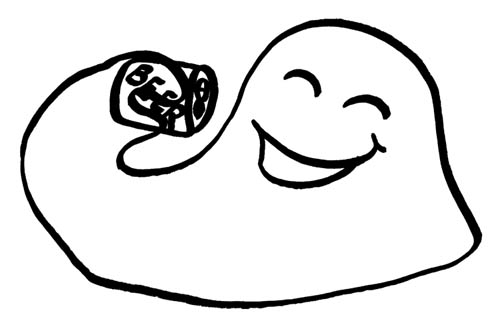
Honestly, I don’t know what exactly it is that jellyfish and slime molds do but whatever it is they do it well, which is why they’re still around despite being among the more ancient organism templates still in common use.
Jellyfish are on the rise.
Yeah, yeah, some species like moon jellies will hang out in huge blooms near the surface feeding, but that’s not what I meant. Jellyfish populations are up. They’re honing in on the open over-fished ocean and making themselves at home. Again.
And, although this makes the sea turtles happy since jellies are a favorite food staple of theirs, not much else is excited about the development. Except for those fish that like to hide out inside of their bells, assuming they don’t accidentally get eaten hanging out in there. But that’s a risk you gotta take when you’re trying to escape predation by surrounding yourself in a bubble of danger that itself wants to eat you. Be eaten or be eaten. Oh, wait…
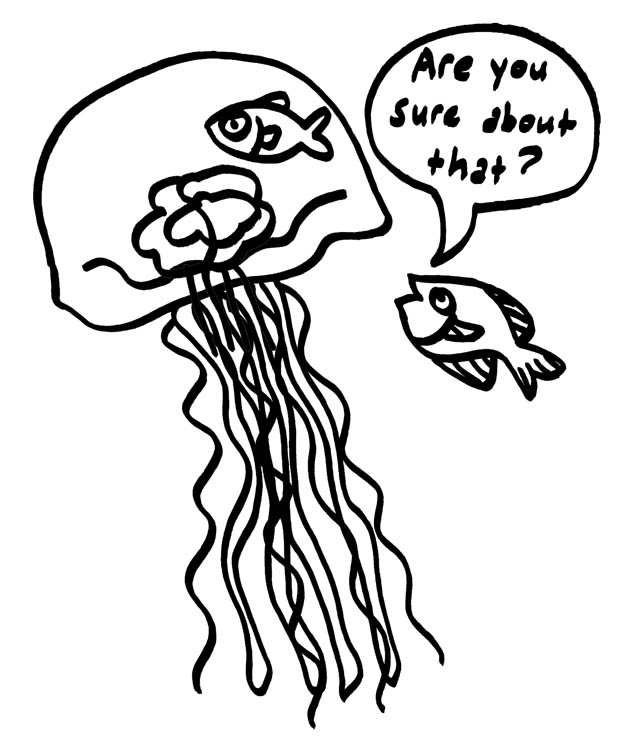
So what makes jellies so scary?
Jellyfish pack some mighty venom. Despite obvious differences in mobility, they are related to anemones and corals. But not the Man o’ War which looks similar but is actually a community of microorganisms that function together as a whole, not one creature. Not that it matters when you’re on the wrong end of a nematocyst, really. Because regardless what it’s attached to, that stings.
Box jellies are among the most venomous creatures in the world and can move of their own accord rather than just drifting about like many smaller jellyfish do. And even if they aren’t deadly, the venom from many jellyfish species will cause blisters and lesions that can take a long time to heal. So even if they do resemble free-floating plastic grocery bags, you’d do best to steer clear. Because those are some dangerous curves.
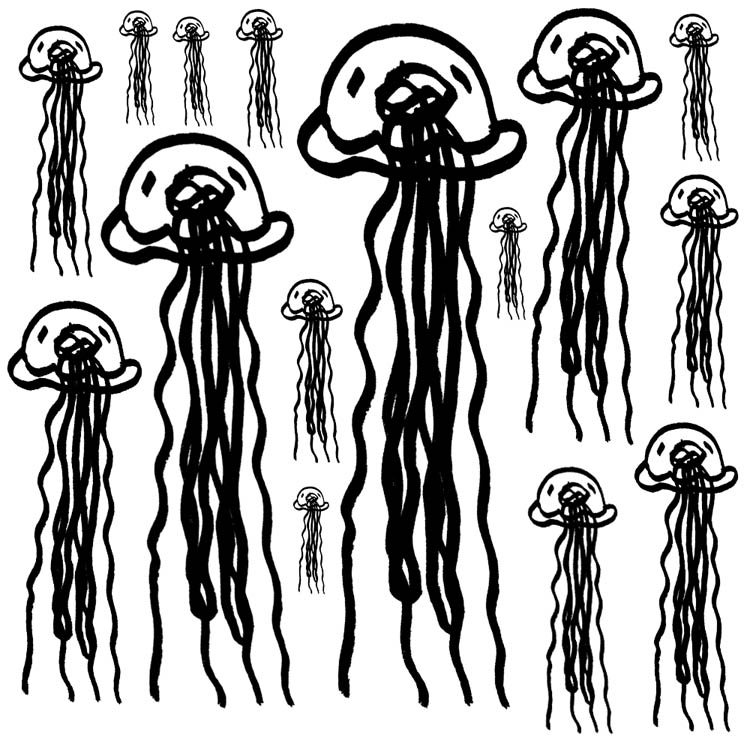
But what does this have to do with slime molds?
Absolutely nothing. I honestly don’t know enough about jellyfish or slime molds to devote the whole of a Nightmarish Nature segment to either, so they had to share. Essentially, this bit is what happened when I decided to toast a bagel before coming up with something to write about and spent a tad too much time in contemplation of my breakfast. I guess we’re lucky I didn’t have any cream cheese or clotted cream…
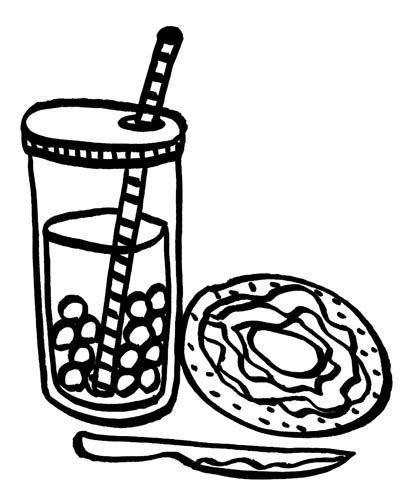
Oh, and also thinking about gelatinous cubes and oozes in the role-playing game sense – because those sort of seem like a weird hybrid between jellies and slime molds, as does The Blob. Any of those amoeba influenced creatures are horrific by their very nature – they don’t even need to be souped up, just ask anyone who’s had dysentery.
And one of the most interesting thing about slime molds is that they can take the shortest path to food even when confronted with very complex barriers. They are maze masterminds and would give the Minotaur more than a run for his money, especially if he had or was food. They have even proven capable of determining the most efficient paths for water lines or railways in metropolitan regions, which is kind of crazy when you really think about it. Check it out in Scientific American here. So, if we assume that this is essentially the model upon which The Blob was built, then it’s kind of a miracle anything got away. And slime molds are coming under closer scrutiny and study as alternative means of creating computer components are being explored.
Jellies are the Wave of the Future.
We are learning that there may be a myriad of uses for jellyfish from foodstuffs to cosmetic products as we rethink how we interact with them. They are even proving useful in cleaning up plastic pollution. I don’t know how I feel about the foodstuff angle for all that they’ve been a part of various recipes for a long time. From what I’ve seen of the jellyfish cookbook recipes, they just don’t look that appealing. But then again I hate boba with a passion, so I’m probably not the best candidate to consider the possibility.
So it seems that jellies are kind of the wave of the future as we find that they can help solve our problems. That’s pretty impressive for some brainless millions of years old critter condiments. Past – present – perpetuity! Who knows what else we’d have found if evolution hadn’t cleaned out the fridge every so often?
Feel free to check out more Nightmarish Nature here.
Original Series
Lucky Lucky Wolfwere Saga Part 4 from Jennifer Weigel
Published
2 weeks agoon
March 17, 2025Continuing our junkyard dawg werewolf story from the previous St. Patrick’s Days… though technically he’s more of a wolfwere but wolfwhatever. Anyway, here are Part 1 from 2022, Part 2 from 2023 and Part 3 from 2024 if you want to catch up.
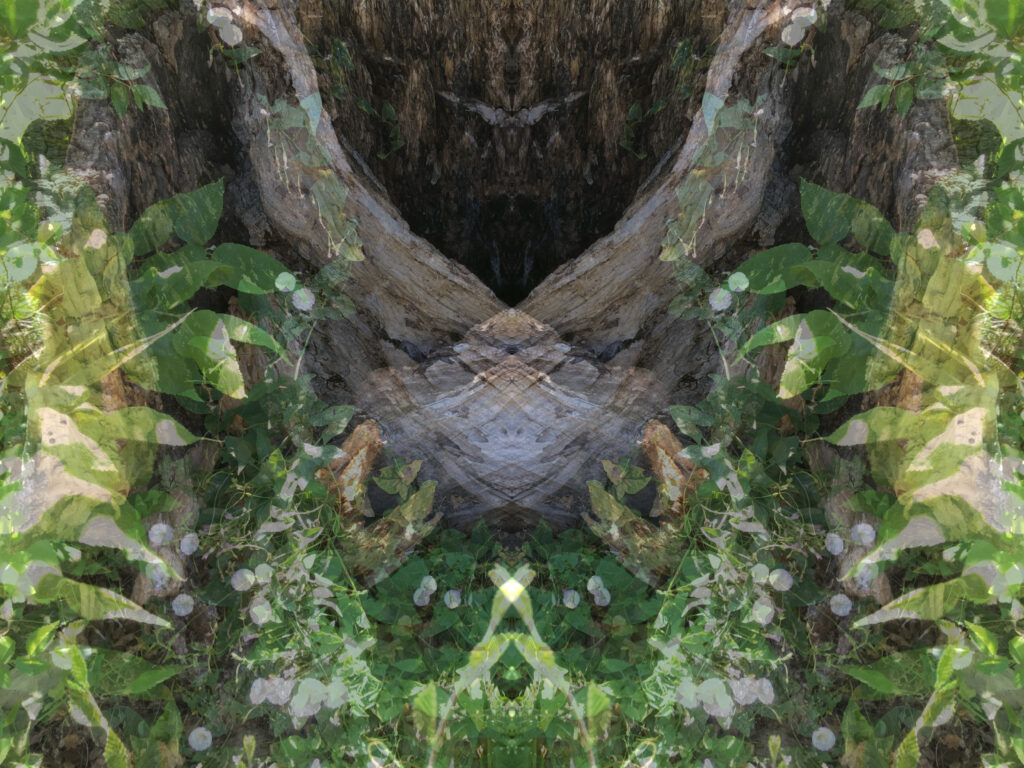
Yeah I don’t know how you managed to find me after all this time. We haven’t been the easiest to track down, Monty and I, and we like it that way. Though actually, you’ve managed to find me every St. Patrick’s Day since 2022 despite me being someplace else every single time. It’s a little disconcerting, like I’m starting to wonder if I was microchipped way back in the day in 2021 when I was out lollygagging around and blacked out behind that taco hut…
Anyway as I’d mentioned before, that Scratchers was a winner. And I’d already moved in with Monty come last St. Patrick’s Day. Hell, he’d already begun the process of cashing in the Scratchers, and what a process that was. It made my head spin, like too many squirrels chirping at you from three different trees at once. We did get the money eventually though.
Since I saw you last, we were kicked out of Monty’s crap apartment and had gone to live with his parents while we sorted things out. Thank goodness that was short-lived; his mother is a nosy one for sure, and Monty didn’t want to let on he was sitting on a gold mine as he knew they’d want a cut even though they had it made already. She did make a mean brisket though, and it sure beat living with Sal. Just sayin.
Anyway, we finally got a better beater car and headed west. I was livin’ the dream. We were seeing the country, driving out along old Route 66, for the most part. At least until our car broke down just outside of Roswell near the mountains and we decided to just shack it up there. (Boy, Monty sure can pick ‘em. It’s like he has radar for bad cars. Calling them lemons would be generous. At least it’s not high maintenance women who won’t toss you table scraps or let you up on the sofa.)
We found ourselves the perfect little cabin in the woods. And it turns out we were in the heart of Bigfoot Country, depending on who you ask. I wouldn’t know, I’ve never seen one. But it seems that Monty was all into all of those supernatural things: aliens, Bigfoot, even werewolves. And finding out his instincts on me were legit only added fuel to that fire. So now he sees himself as some sort of paranormal investigator.
Whatever. I keep telling him this werewolf gig isn’t all that it’s cracked up to be, and it doesn’t work like in the movies. I wasn’t bitten, and I generally don’t bite unless provoked. He says technically I’m a wolfwere, to which I just reply “Where?” and smile. Whatever. It’s the little things I guess. I just wish everything didn’t come out as a bark most of the time, though Monty’s gotten pretty good at interpreting… As long as he doesn’t get the government involved, and considering his take on the government himself that would seem to be a long stretch. We both prefer the down low.
So here we are, still livin’ the dream. There aren’t all that many rabbits out here but it’s quiet and the locals don’t seem to notice me all that much. And Monty can run around and make like he’s gonna have some kind of sighting of Bigfoot or aliens or the like. As long as the pantry’s stocked it’s no hair off my back. Sure, there are scads of tourists, but they can be fun to mess around with, especially at that time of the month if I happen to catch them out and about.
Speaking of tourists, I even ran into that misspent youth from way back in 2021 at the convenience store; I spotted him at the Quickie Mart along the highway here. I guess he and his girlfriend were apparently on walkabout (or car-about) perhaps making their way to California or something. He even bought me another cookie. Small world. But we all knew that already…
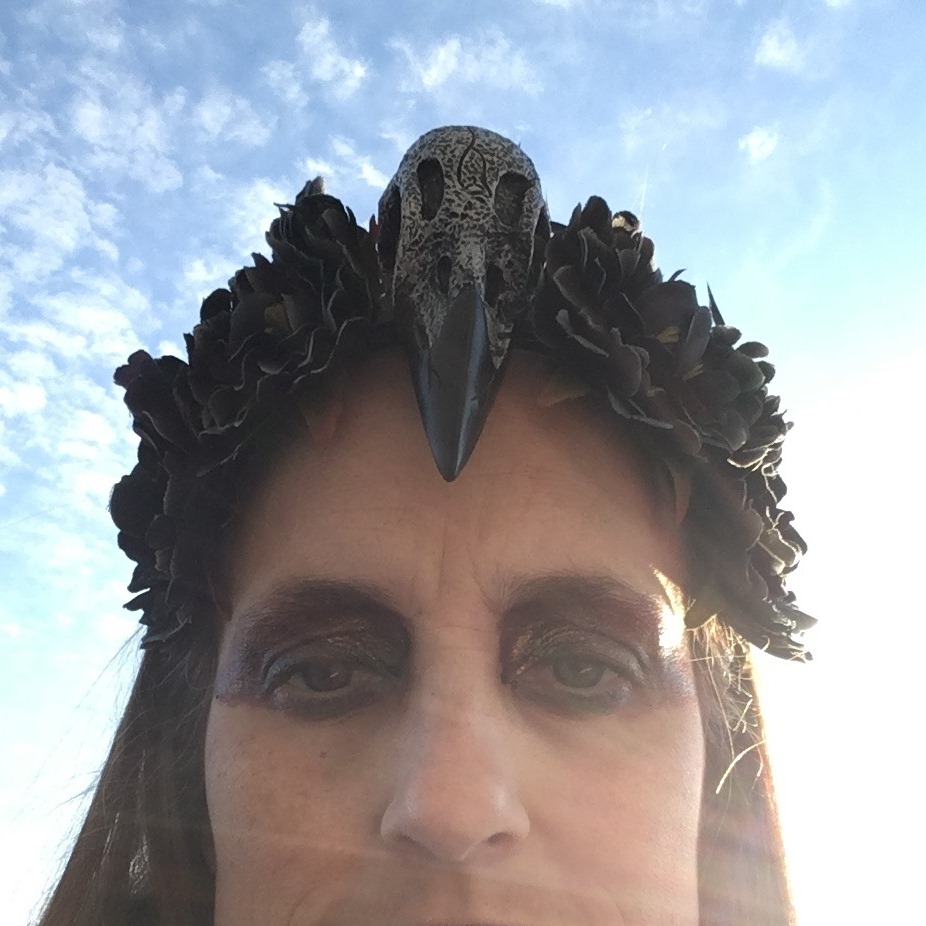
If you enjoyed this werewolf wolfwere wolfwhatever saga, feel free to check out more of Jennifer Weigel’s work here on Haunted MTL or here on her website.




